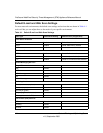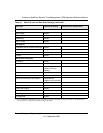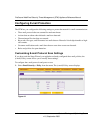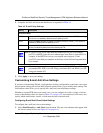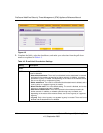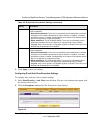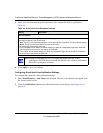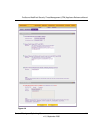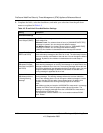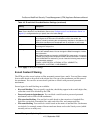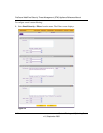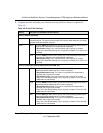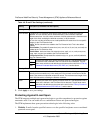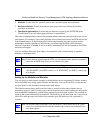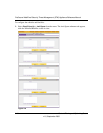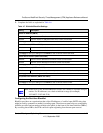
ProSecure Web/Email Security Threat Management (STM) Appliance Reference Manual
4-10 Content Filtering and Optimizing Scans
v1.0, September 2009
3. Complete the fields, select the checkboxes, and make your selections from the pull-down
menus as explained in Table 4-5.
Table 4-5. E-mail Anti-Virus Notification Settings
Setting Description
Notification Settings
Insert Warning into
Email Subject (SMTP)
For SMTP e-mail messages, select this checkbox to insert a warning into the
e-mail subject line:
• Malware Found. If a malware threat is found, a “[MALWARE INFECTED]”
message is inserted. You can change this default message.
• No Malware Found. If no malware threat is found, a “[MALWARE FREE]”
message is inserted. You can change this default message.
By default, this checkbox is deselected and no warnings are inserted.
Append Safe Stamp
(SMTP and POP3)
For SMTP and POP3 e-mail messages, select this checkbox to insert a
default safe stamp message at the end of an e-mail. The safe stamp insertion
serves as a security confirmation to the end user. You can change the default
message. By default, this checkbox is deselected and no safe stamp is
inserted.
Append Warning if
Attachment Exceeds
Scan Size Limit (SMTP
and POP3)
For SMTP and POP3 e-mail messages, select this checkbox to append a
default warning message to an e-mail if the message or an attachment to the
message exceeds the scan size limit. The warning message informs the end
user that the attachment was skipped and might not be safe to open. You can
change the default message. By default, this checkbox is selected and a
warning message is appended to the e-mail.
Replace Infected
Attachments with the
Following Warning
Message
Select this checkbox to replace an e-mail that is infected with a default
warning message. The warning message informs the end user about the
name of the malware threat. You can change the default message to include
the action that the STM has taken (see example below). By default, this
checkbox is selected and a warning message replaces an infected
e-mail.
Note: Make sure that you keep the %VIRUSINFO% meta word in a message
to enable the STM to insert the proper malware threat information. The
following is an example message where the %VIRUSINFO% meta word is
replaced with the EICAR test virus:
“This attachment contains malware: File 1.exe contains malware EICAR.
Action: Delete.”



